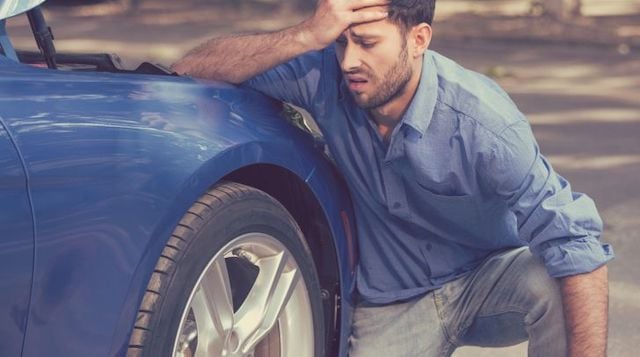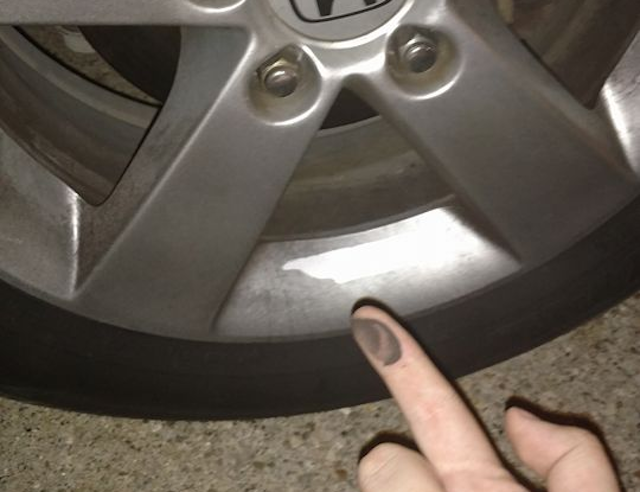If you hear an unusual noise while braking, there’s something wrong with your brake system. The type of noise you hear can tell you a lot about what’s going on with your brakes. In general, brakes only make four different noises:
- Squeaking noise (high pitched and short duration)
- Squealing noise (high pitched and longer duration)
- Rattling noise
- Grinding noise
In this guide, we’ll help you narrow down the possible reasons your brakes are making noise.
The Most Common Causes Of Noisy Brakes

There are some different issues that cause your brakes to make noise. Let’s discuss some of the most common ones:
1. Worn Brakes
This is one of the more serious issues that brake noise can reveal. Brakes that make too much noise may be wearing out and need to be replaced soon.
When brake pads wear out, the backing plate can start rubbing against the rotor. This causes friction, which makes noise. When you press on your brake pedal, it pushes the pad inwards and applies pressure to the rotor. If your brake pads have no friction material left, there will be a lot of metal-to-metal contact. That causes unusual brake noise.
If any brake part is too worn, it should be replaced. That includes rotors, pads, or shoes. Worn parts can cause deterioration in other parts of the system,. This leads to total brake failure or a serious safety issue.
2. Brake Dust And/Or Road Contaminants
The brake system can become dirty with deposits and contaminants. When that happens, your braking becomes less effective. Dust and other residues can build up on the brake system with prolonged exposure to the elements. This may cause uneven braking and significant noise. To read more about the relationship between brake noise and dust, check out this post.
3. Incompatibility With The Brake System
When you use brake pads that aren’t designed to work with your rotors, the result will be excessive brake noise.
Let’s say your car has rotors that are compatible with ceramic brake pads. Using semi-metallic pads will probably result in grinding sounds and excessive dust. It’s because semi-metallic pads don’t match the rotor surface very well. This can cause more noise and dust than normal. Ceramic pads are much harder than semi-metallic ones, and rotors designed for ceramic pads usually have harder structure as well.
4. Excessive Heat
When heat becomes excessive in the brake system, the brakes may glaze over. Excessive heat can occur as a result of:
- Too worn brake pads
- Hard driving
- Towing
- Improperly adjusted drum brakes
Are Your Brakes Making A Squeaking Noise?

There are several different reasons your brakes are squeaking:
1. Worn Brake Pads And/Or Rotors
It could be that your brake pads are close to being worn down. It’s also possible that your rotors need to be replaced. In either case, you should inspect your brakes for any excessive wear.
2. Worn Guide Pins
It’s possible that you guide pins are worn out. For example, there may be pitting or surface rusting. When the brakes are applied, the caliper slides slightly on the guide pins. If they are worn, this can cause squeaking. You need to diagnose and repair this issue ASAP. Worn guide pins can cause uneven and rapid pad wear. If the pads wear too far, the rotor may be damaged.
3. Hard Braking
Hard braking causes your brakes to wear out faster. It may also causes the brake discs to warp, which may cause squeaking.
Whatever the reason, get your brakes checked out ASAP. Please note that it can be normal for your brakes to squeak after installing new brake pads.
Are Your Brakes Making A Squealing Noise?

Squealing is usually caused by an abnormal vibration. Squealing is different from a squeak in that the sound lasts for a few seconds. There are a few possible causes:
- Excessive Dust – Some brake pads produce excessive dust. The dust coats the surface of the pad. When the brakes are gently applied, the dust causes the pad to vibrate and squeal. If dust is the problem, applying the brakes harder will cause the squealing to stop. Rather than just braking harder all the time, the long term fix is to switch to pads that make less dust.
- Glazed Rotor Surfaces – Glazed rotor surfaces can also cause squealing. Rotors can develop a glaze from being used for hard braking, and then coming to a stop while the pads and rotors are still hot. A very tiny portion of the pad will transfer to the rotor. This leaves a coating known as glaze. It can also cause the brake pads to vibrate under braking.
- Wear Indicator – Most brake pads have a slender piece of metal attached to them that is designed to squeal when the brake pads need replacement. When the pad wears far enough, the indicator comes into contact with the rotor and vibrates. This squeal is often fairly quiet, and cars have become very well sound proofed.
If you hear a squealing noise, it’s worth taking the time to give your brake system a thorough inspection. You’ll be able to find out exactly why your brakes are squealing.
Are Your Brakes Making A Rattling Noise?

Rattling noises from the brakes are uncommon, and you should either inspect the brakes or have a shop do it. There are a couple possible causes of rattling:
- Most brake pads use small metal springs and shims to secure the pads in the correct position. Sometimes these will fall out or rust out. When that happens, the pad can rattle a bit in the caliper.
- Worn guide pins can cause the pads to wear unevenly. They begin to hit the rotor with a slanted wear surface, so they no longer slide properly in the caliper.
Are Your Brakes Making A Grinding Noise?

If you hear a grinding noise, there’s some hard contact between two parts. It’s also possible that road debris and other impurities have built up within the brake system. The most common reasons include:
- Road debris: Road debris, such as small stone, can get caught between the pad and rotor.
- Crusty build-up on the rotor edge: The rotor edges may start rusting. The buildup of rust can come into contact with the pads.
- Worn brake pads: When there’s little to no friction material on brake pads, the metal backing plate will make contact with the rotor.
This guide will help you navigate each possible cause and hopefully narrow them down.



